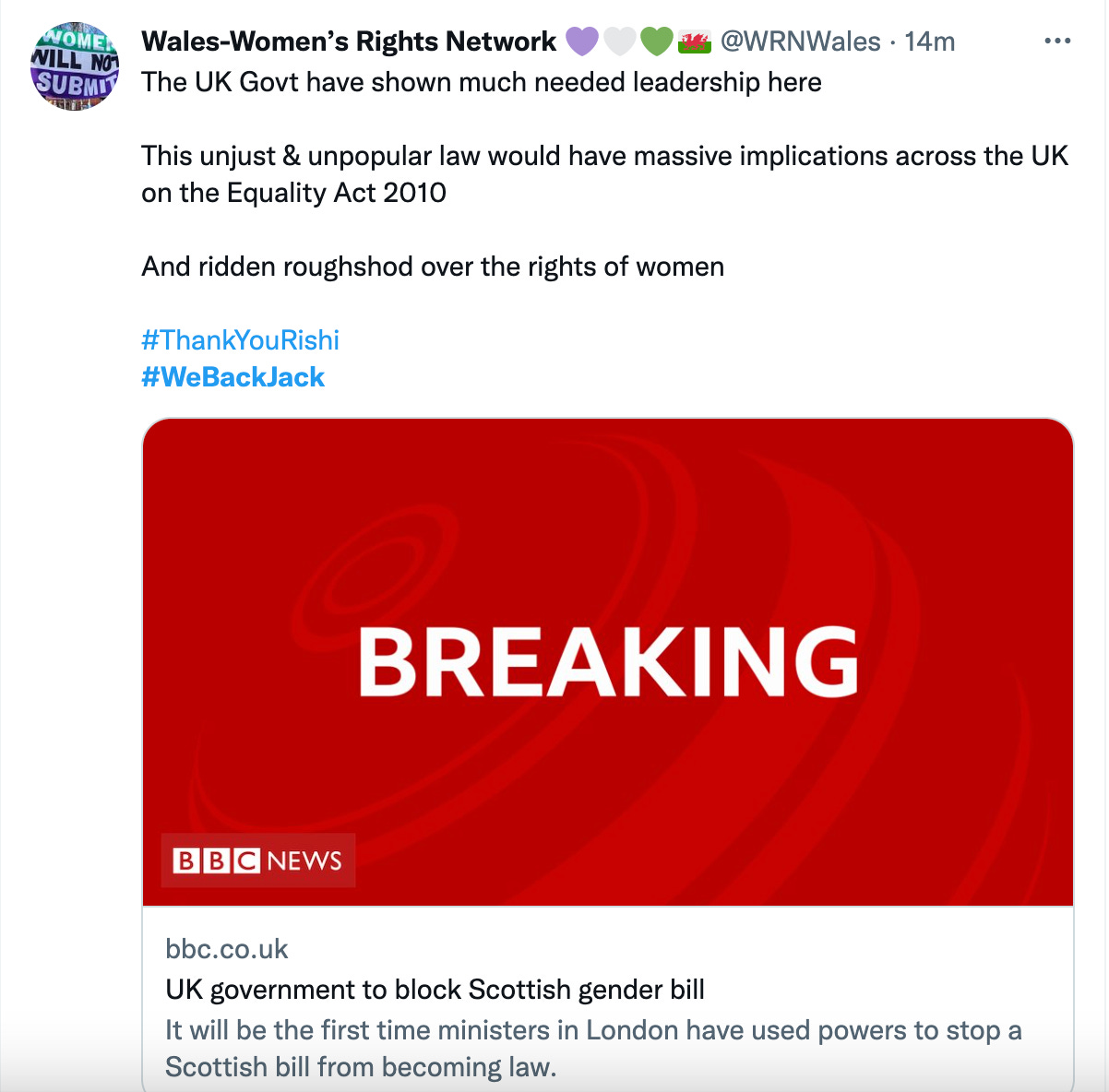What's happening with sex and gender in Scotland?
I now know more about Section 35(1)(b) of the Scotland Act than I ever thought I would
January 16, 2023
This post is being sent to all subscribers of this Substack. It is free and shareable. If you would like to have access to content that delves more deeply into the movement to protect the sex-based rights of women and girls and to stop the abolition of sex, please consider a paid subscription.
I generally do my best to avoid weighing in on matters (especially complex legal matters) that are happening outside of the United States because, to be honest, I am aware that there is always a reasonable likelihood that I have no idea what I’m talking about. I have made an exception in order to comment on what has been happening over the past couple of weeks with respect to sex and gender in Scotland.
On December 21, I wrote this post about a letter that was read aloud to women who were standing outside the Scottish Parliament in Holyrood to protest the likely passage of the “Gender Recognition Reform” bill, which would have allowed anyone (over 16) to be legally recognized as the opposite sex on the basis of their self-declaration. The piece was called “J.K. Rowling’s Unyielding Support for Women and Girls” because the letter that was read aloud outside Parliament was written by the queen herself. Scottish feminists were rightly generally upset because they don’t want men to simply be permitted to claim to be women on the basis of their say-so, and particularly upset because the law is likely to be used to allow convicted male rapists and murderers to be housed in women’s prisons. That had already been happening, but the concern was that the new law would make it even easier for men to obtain access to women’s prisons by claiming to be women.
The next day the bill passed and I published this piece in Newsweek and then cross-posted it here.
About a week later, a Member of the Scottish Parliament celebrated the passage of the law by invoking the memory of Nelson Mandela. I thought that was a bit odd, because Nelson Mandela himself was such a staunch advocate of separating women and men in prison on the basis of sex that he got the principle enshrined in international law. I wrote about that here (and, fun fact, J.K. Rowling retweeted my tweet of that piece).
Today, it has come out that the UK government plans to block the law. This is a big deal and, from what I can tell, Scottish feminists are quite happy about it, even though it means that the UK is, for the first time in history, blocking a law that was passed by the Scottish Parliament.
The mechanism through which this is possible is something called a s.35 order. I don’t generally have any idea what that means, but if I am understanding properly from the crash course that I just took on the topic, the gist is this:
The Secretary of State for Scotland is appointed by the Prime Minister of the UK and serves as a member of the Cabinet of the UK. In this instance, the Secretary of State is Alister Jack, appointed in 2019 by Boris Johnson (and subsequently reappointed twice).
Section 35(1)(b) of the Scotland Act permits the Secretary of State to make an order precluding the Presiding Officer from submitting a Bill for Royal Assent (the Monarch's agreement that is required to make a Bill into an Act of Parliament).
The Secretary of State may do this upon making a finding that the bill in question (in this case the Gender Recognition Bill) contains provisions “which make modifications of the law as it applies to reserved matters and which the Secretary of State has reasonable grounds to believe would have an adverse effect on the operation of the law as it applies to reserved matters.”
My understanding is that no previous Secretary of State for Scotland has ever invoked this measure.
I have it on good authority that the Scottish women who are affiliated with Women’s Declaration International (WDI) are quite happy about this development.
As are other Scottish feminist organizations.
(SNP refers to the Scottish National Party.)
And just about every UK-based feminist group that I follow on Twitter.
In fact, the move appears to be very popular overall.
In any event, Nicola Sturgeon, who steadfastly backed the law over the objections of countless women, was quite unhappy about the development, so I guess it pretty much has to be a good thing!
I guess in her zeal to denounce the move, First Minister Sturgeon forgot how to use apostrophes properly.
(I have no views on whether s.35 is a good law or not a good law, and that’s none of my business.)
It’s interesting to me that so many Scottish people (feminists, especially) support this move by the UK to block a wildly unpopular law that was enacted by its own government. I have to wonder (rhetorically, of course, as I would never tell them what to do) whether that will give Members of the Scottish Parliament pause before doing something so wretched again.
Congratulations Scottish women, and well done!











